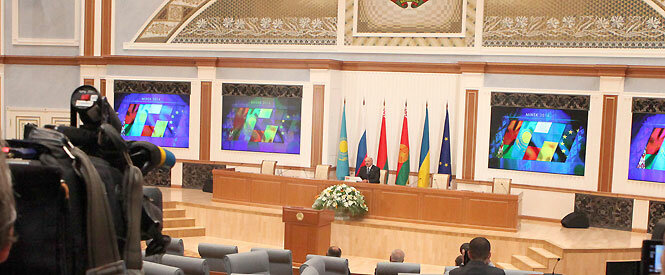A press statement by President of the Republic of Belarus Aleksandr Lukashenko after the meeting of the Presidents of the Customs Union, Ukraine and EU high representatives
- 16
Participants of the Minsk talks agreed on the need to de-escalate the conflict, free hostages, solve the problems of refugees, and provide humanitarian support, Belarusian President Aleksandr Lukashenko told media after the talks between the Presidents of the Customs Union, Ukraine and the EU high representatives had finished in Minsk on 26 August.
Belarusian President Aleksandr Lukashenko talked to media without his colleagues and the EU officials. According to the Belarusian leader, the Presidents and the EU representatives agreed that the Belarusian President would brief the press about what happened at the Minsk meeting.
Aleksandr Lukashenko noted that there was a serious discussion on the full range of issues arising from the crisis in Ukraine. He stated with regret that the situation has gone bad enough, and that no separate steps, technical arrangements would lead to a settlement without fundamentals decisions at the highest level.
"Of course, we all wanted a breakthrough: immediate pivotal decisions, concrete agreements to stop the bloodshed, start the political dialogue in Ukraine with the participation of all parties to the conflict, and settle economic disputes. But the very fact of holding the meeting today is already a success, undoubtedly,” the Belarusian leader believes.
Aleksandr Lukashenko noted that the participants of the meeting wanted to develop a conceptual algorithm of action acceptable to all as the basis for reaching specific agreements in all directions in the future. "The talks were not easy, but the dialogue was very substantive and frank. It is important that this dialogue took place. During the nearly four-hour meeting everybody voiced their opinions. Of course, I should note that the positions of the parties differ, sometimes fundamentally. But it is important that all converge in one: a compromise is needed,” the Belarusian President said.
“In the discussion of the conflict in the east of Ukraine all parties agreed on the need for the de-escalation of the situation, the release of hostages, humanitarian assistance and other issues. It is crucial to prevent the humanitarian disaster, especially before winter time,” the Belarusian head of state said.
Aleksandr Lukashenko said that all risks had been analyzed for the Russian Federation and other Customs Union member states following Ukraine’s signing of the EU association agreement. The parties discussed all the aspects of this process, including possible impact from tariff and non-tariff changes, technical standards, sanitary and veterinary norms and customs administration.
The participants of the meeting also talked over energy issues, i.e. hydrocarbon material transit and supplies. “In this respect the Customs Union-Ukraine-EU format of today’s meeting in Minsk is logical and optimal. It was the first time the dialogue of the kind took place between the two most powerful integration associations on the continent. The talks in Belarus are the first step in the right direction,” the Belarusian leader noted.
Aleksandr Lukashenko noted that certain agreements were made after the meeting.
Thus, the participants of the high-level talks supported the proposal of Ukrainian President Piotr Poroshenko to make the Belarusian capital a regular venue for the OSCE-Ukraine-Russia contact group meetings.
The proposal of President of Kazakhstan Nursultan Nazarbayev to continue discussing Ukrainian issues in the Belarusian capital was also endorsed.
The Presidents of Russia and Ukraine agreed on a bilateral meeting to discuss the most pressing issues.
“There is the Ukraine-Russia-EU working group on trade and economic relations, and we suggested that it intensify its work to work out, by 12 September, the proposals to resolve the concerns of the Customs Union, the Russian Federation regarding Ukraine’s association agreement with the European Union,” said the Belarusian head of state.
































